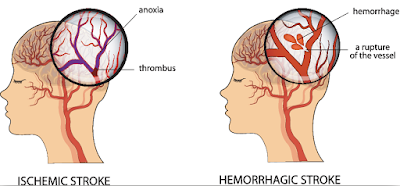We've all heard about the term stroke. We also know that, in India, we come across a million stroke cases. A stroke can happen to anyone and it's very much necessary to be aware of the various aspects of stroke. Here's a brief study about the treatments and diagnosis of stroke.
Ischemic stroke - Quick treatments ought to be provided in order to reduce risks.
* Intravenous injection of tissue plasminogen activator (tPA): This emergency treatment involves medications. Tpa also called the alteplase is considered as one of the best treatments for ischemic stroke. This injection is given via a vein in patient's arm. The drug dissolves the blood clot that causes the stroke and the blood flow is restored.
* Direct delivering of medications into the brain: This is an endovascular emergency procedure. A catheter is inserted via the artery into that area of the brain which suffered stroke to deliver tpa. This procedure is known as the intra-arterial thrombolysis.
Hemorrhagic stroke - The main focus of the treatment is to control bleeding and reducing the pressure in the brain.
Warfarin and anti-platelet drugs can be used to stop blood clots. But when these drugs are used, another set of drugs are given to curb the blood thinners effect. Drugs are given to reduce the pressure in the brain as well.
The doctor can also recommend surgery to treat the abnormal conditions of the blood vessels as a result of the stroke. The surgeries usually recommended are endovascular embolization, surgical clipping, surgical AVM removal etc.
For first rated and reliable treatment for strokes, do visit Dr. Shyam Sundar K for effective stroke treatment in Chennai.
Visit @ www.chennaibrainandspine.com
Mail us: chennaibrainandspine@gmail.com
Book appointment: www.chennaibrainandspine.com/book-appointment.html
Diagnosis of stroke
The doctor will check for various symptoms and signs according to which he will prescribe the treatments. He will also check the patient's blood pressure and also check for little cholesterol crystals and clots in blood vessels. Certain tests are done for precise information about the status of the stroke. They are the following:- Blood tests: These blood tests are taken to know the time taken for the blood to clot, to check the status of the blood's sugar level and the balance of the chemicals. These factors will be managed according to the data received from the tests.
- Magnetic resonance imaging (MRI): The MRI is used to obtain a detailed view of your brain. Any brain tissue damage caused by an ischemic stroke and brain hemorrhages can be detected by such a method. A dye is injected into the blood vessels to get a detailed view of the arteries, veins and also the blood flow.
- Computerized tomography (CT) scan: A sequence of Xrays are used to create detailed views of the image. The CT scan detects tumor, stroke and various other conditions. A dye is injected into the bloodstream to get a clear view of the blood vessels in the neck and the brain.
Treatments
The treatment depends on what kind of stroke the patient has I.e whether it is an ischemic stroke or hemorrhagic stroke. Ischemic stroke is the common one where the artery is blocked and hemorrhagic is the kind of stroke that involves bleeding into the brain. Here are some treatments according to the type of stroke.Ischemic stroke - Quick treatments ought to be provided in order to reduce risks.
* Intravenous injection of tissue plasminogen activator (tPA): This emergency treatment involves medications. Tpa also called the alteplase is considered as one of the best treatments for ischemic stroke. This injection is given via a vein in patient's arm. The drug dissolves the blood clot that causes the stroke and the blood flow is restored.
* Direct delivering of medications into the brain: This is an endovascular emergency procedure. A catheter is inserted via the artery into that area of the brain which suffered stroke to deliver tpa. This procedure is known as the intra-arterial thrombolysis.
Hemorrhagic stroke - The main focus of the treatment is to control bleeding and reducing the pressure in the brain.
Warfarin and anti-platelet drugs can be used to stop blood clots. But when these drugs are used, another set of drugs are given to curb the blood thinners effect. Drugs are given to reduce the pressure in the brain as well.
The doctor can also recommend surgery to treat the abnormal conditions of the blood vessels as a result of the stroke. The surgeries usually recommended are endovascular embolization, surgical clipping, surgical AVM removal etc.
For first rated and reliable treatment for strokes, do visit Dr. Shyam Sundar K for effective stroke treatment in Chennai.
Visit @ www.chennaibrainandspine.com
Mail us: chennaibrainandspine@gmail.com
Book appointment: www.chennaibrainandspine.com/book-appointment.html







